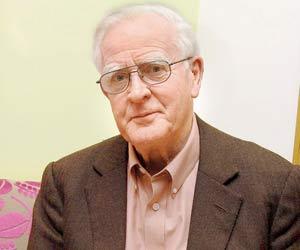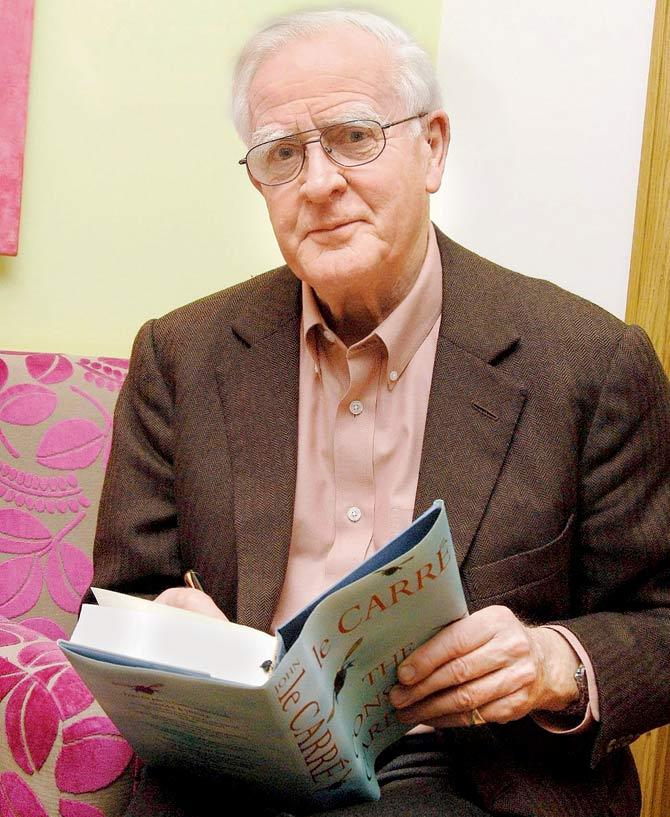Although the author has long been a favourite, particularly the books dating back to the Cold War, A Legacy of Spies is a disappointment

 John le Carre is a favourite, though his best novels date back to the height of the Cold War. The Smiley's People trilogy, beginning with Soldier, Sailor, Tinker, Spy (1974), is terrific but the one I have re-read countless times is unglamorous yet masterful The Spy Who Came in From the Cold (1963), about a double deception operation. even though Soviet communism and europe's Iron Curtain are now relics, these espionage novels stand the test of time. (Like Agatha Christie's mysteries they double as nostalgia for an england that has recently slipped away.) Since the Cold War provided Le Carre's novels with an identifiable and formidable foe, the 1989 liberation of eastern europe and the 1991 dissolution of the USSR snatched away the raison d'etre of Smiley's Universe.
John le Carre is a favourite, though his best novels date back to the height of the Cold War. The Smiley's People trilogy, beginning with Soldier, Sailor, Tinker, Spy (1974), is terrific but the one I have re-read countless times is unglamorous yet masterful The Spy Who Came in From the Cold (1963), about a double deception operation. even though Soviet communism and europe's Iron Curtain are now relics, these espionage novels stand the test of time. (Like Agatha Christie's mysteries they double as nostalgia for an england that has recently slipped away.) Since the Cold War provided Le Carre's novels with an identifiable and formidable foe, the 1989 liberation of eastern europe and the 1991 dissolution of the USSR snatched away the raison d'etre of Smiley's Universe.
ADVERTISEMENT

John Le Carre. Pic/Getty Images
No wonder the novels churned out after A Perfect Spy (1986) lack a compelling narrative. Le Carre conjured topical narratives involving Chechen separatists and Latin American upheavals, and some were made into movies; but these are nothing more than current events potboilers, nowhere as engrossing as the chess-game Cold War novels. It may also be Britain's declining profile in global affairs, post-World War II; America began managing international affairs in 1945, and Britain's decline was hastened by the betrayal by its spies (notably Kim Philby) uncovered in the 1960s. Perhaps that's why British fiction and cinema (think Dunkirk) repeatedly return to WWII, Britain's final moment of glory.
Le Carre's espionage novels so engrossed me that early in my career, I constantly sought out spies. In the 1980s, I befriended a man who ran the Intelligence Bureau's Punjab operations; Ajit Doval is now India's National Security Advisor. In the 1990s, I befriended the IB's Kashmir pointsman, who later became India's spy chief when he took over the Research and Analysis Wing; AS Dulat and I co-wrote Kashmir: The Vajpayee Years (2015). I have other espiocrat friends too. Besides Doval's operation to retrieve Romanian diplomat Liviu Radu from Khalistani terrorists in 1991, and besides Dulat's story or two that are too hot for print, India doesn't seem to produce espionage stories that match le Carre.
So when the publicity blitz for Le Carre's latest, A Legacy of Spies, promised a return to Smiley's Universe, I was ecstatic. It stars Peter Guillam, George Smiley's trusted assistant, who would today be 84 years old - around the same as le Carre. And, tantalisingly, A Legacy of Spies was said to be a sequel of sorts to The Spy Who Came in From the Cold. In anticipation, I wondered if Vladimir Putin had provided a proper villain for Le Carre, since he has resurrected the more sinister aspects of his (impoverished) Russian State, which recently wreaked havoc through surveillance and electronic deception in US elections. As soon as the novel was electronically available, I downloaded it (even though I by far prefer physical books).
except for an interesting (and major) twist two-thirds of the way through, A Legacy of Spies is rather disappointing. Craft-wise, it has an interesting structure, in that it is both a sequel and a prequel to The Spy Who Came in From the Cold: Britain's modern Secret Intelligence Service has dug out the case which took the lives of field agent Alec Leamas and english citizen Liz Gold in divided Berlin, because it is being sued by their respective children. Yet key files from the era are missing - secreted away by Smiley from the suspected high-level mole in the service - and so the elderly Guillam is summoned by lawyers to find and "read" the files. He complies. (The novel gives a fascinating insight into the bureaucratic coldness that even former warrior spooks face.) This retelling of the story that led to The Spy Who Came in From the Cold, and Guillam's expanded role within it - Le Carre makes clever use of a moment in the earlier novel where Smiley is accompanied by a "younger associate", so as to sneak Guillam into the later narrative - is what gives the story its meat, and like the earlier novel, uses a tragic heroine as the narrative's emotional core.
Yet the pay-off at the end is a damp squib, even as readers' expectations about George Smiley are fulfilled. Perhaps this is the problem with espionage: It is simply an unglamorous bureaucracy of eggheads sitting around and plotting sophisticated mind games, and Le Carre delivered the only story worth telling. Or perhaps it is a problem with writing: Authors usually have one story to tell, the great ones two or three. The rest, as evidenced by Salman Rushdie's latest bore-bomb, just don't know when to give up, and in the process tarnish the gold they had earlier mined. By my reckoning, you'd be far, far better off reading the Karachi anti-terrorism cop-turned-writer, Omar Shahid Hamid.
Aditya Sinha's crime novel, The CeO Who Lost His Head, is available now. He tweets @autumnshade. Send your feedback to mailbag@mid-day.com
 Subscribe today by clicking the link and stay updated with the latest news!" Click here!
Subscribe today by clicking the link and stay updated with the latest news!" Click here!






